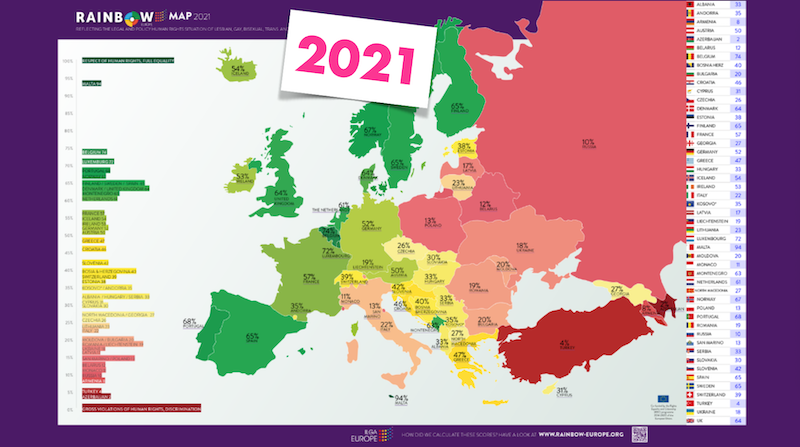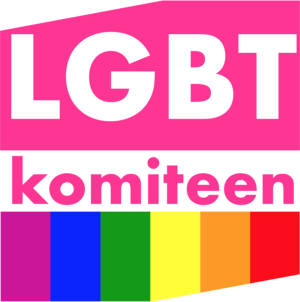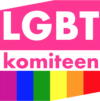
Bekymrende stilstand: Ingen fremgang for LGBT-rettigheder i Europa: Jeg har genbrugt overskriften fra sidste år. Vi må konstatere, at der igen er gået et år, hvor de politike systemer i de europæiske lande har været for belastet af udfordringer med covid-19-krisen, så der ikke har været overskud til at skabe fremgang på LGBI-området.
I Danmark har vi set det meget konkret, blandt andet i form af udsættelsen af et lovforslag om revision af beskyttelseslovene. Det var i høring, men efterfølgende blev det besluttet at udsætte lovforslaget til næste samling.
Tendensen er den samme i hele Europa, hvilket man kan overbevise sig om via det nye Rainbow Map fra ILGA-Europe, som er udgivet i dag.
Som det har været tilfældet i de sidste mange år har LGBT komiteens Søren Laursen også i år været en af de danske landeeksperter, der har bidraget med viden herfra.
Artiklen om Rainbow Map 2020: Bekymrende stilstand: Ingen fremgang for LGBT-rettigheder i Europa
ILGA-Europes pressemeddelelse
Time for a reboot on LGBTI rights in Europe as Rainbow Map reveals a disturbing stand-still
As the 2021 Rainbow Europe Map reveals widespread and almost complete stagnation on human rights of LGBTI people, we are at a juncture when governments can actively choose the right way forward, says leading LGBTI rights organisation, ILGA-Europe.
Published on Monday, May 17 2021, ILGA-Europe’s annual Rainbow Europe Map and Index, ranking the legal and policy situation of LGBTI people in 49 European countries, finds that over the past 12 months advances in LGBTI rights have come to almost a complete standstill. But, with legislative proposals and action plans on the table in some countries, governments now have the opportunity to ensure the Rainbow Map will look very different this time next year.
Released every year since 2009 on International Day Against Homophobia, Transphobia, Biphobia, and Intersexphobia (IDAHOBIT), the ILGA-Europe Rainbow Map ranks all 49 European countries on a scale between 0% (gross violations of human rights, discrimination) and 100% (respect of human rights, full equality). The past 12 months have marked an unprecedented year in the Map’s 12-year history, with almost no positive legislative change for LGBTI people in Europe.
Among the broad findings from this year’s Rainbow Europe Map are:
- Against a background of hardly any positive change at all, countries such as Albania, Finland and Portugal have moved up in the ranking, but only because of very small changes implemented.
- Despite clear commitments on rainbow family recognition, not one country has moved on partnership or parenthood recognition.
- After reporting positive changes in bodily integrity or legal gender recognition for many years, there is no change this year for intersex and trans rights apart from Iceland
- On a positive note, some countries (Bosnia and Herzegovina, North Macedonia) now have points on freedom of assembly, reflecting improvements of safety for public LGBTI events
Executive Director of ILGA-Europe, Evelyne Paradis said: “It is deeply worrying to report an almost complete standstill on LGBTI rights and equality, especially at such a critical time for LGBTI communities. In the past year, we’ve seen increased political repression against LGBTI people, a stark rise in socio-economic hardship, and the spreading of LGBTI-phobic hatred on the streets and online across the region. Against this backdrop, the response from governments has to be more and better concrete action, to make sure people are more protected, not less. The human rights of LGBTI people simply cannot be something that you drop when circumstances are challenging.”
Katrin Hugendubel, ILGA-Europe’s Advocacy Director added: “So many legislative processes have been stalled in Europe over the past 12 months, in countries including Cyprus, Czechia, Denmark, Finland, France, Italy, Kosovo, Lithuania, Moldova, Montenegro, the Netherlands, Sweden, and the United Kingdom. We also see the implementation of existing procedures, for example on legal gender recognition, worsening, including in Georgia, Spain, Serbia and Northern Ireland”.
“It would be easy to blame it all on political attention being immersed in the public health response to COVID-19 and the ensuing economic fall-out, but the reality is a lot more complex. In too many countries, progress is stopped because there’s increased political polarisation on LGBTI issues, because some elected officials no longer see gains to be made by supporting LGBTI equality, and because governments don’t see it as a priority issue. We do really need governments across Europe to relaunch their political commitments to see legislative processes through, and to give everyone the means to ensure full implementation.”
Evelyne Paradis concluded: “There is a silver lining in this story: if governments actively choose to do the right thing and take real action, our Rainbow Map can look positively different by this time next year. At least 15 countries, including France, Kosovo, Bosnia & Herzegovina, Czechia and Ukraine, have legislative proposals, action plans and policy discussions already on the table. Others, such as Montenegro, have to make sure the laws they adopted effectively come into force, while many more know what they can and need to do to make sure their laws and policies have the desired impact for LGBTI lives.
“At a juncture in history when anti-LGBTI forces are rife, not only in headline-grabbing countries like Poland and Hungary, but across Europe, LGBTI people need all governments to seize this moment and make sure Europe remains a committed and active leader in the arena of human rights for everyone.”
Summary of Rainbow Europe 2021:
For the sixth year in a row, Malta continues to occupy the number one spot on the Rainbow Europe Map, while Belgium comes second place for the fourth time, and Luxembourg occupies the third spot on the ranking for the third year in a row.
The three countries at the bottom end of the Rainbow Europe Map are Azerbaijan, Turkey, and Armenia, exactly the same as last year.
For the second year in a row, Poland continues to occupy the lowest ranking in the EU.
Ukraine has gone down four places from 36 to 40, due to the expiration of its government’s action plan, while Georgia has gone down two places, from 30 to 32, due to the lack of clear procedure for legal gender recognition and the risky situation of LGBTI human rights defenders in the country.
Malta, North Macedonia, and Bosnia & Herzegovina are the three countries with the biggest jump in scores. Malta added sex characteristics under protected grounds in the Refugees Act and published new policy guidelines for LGBTI asylum claims, while in both North Macedonia and Bosnia & Herzegovina freedom of assembly has been improving.
ENDS
Further information:
All Rainbow Europe 2021 information is available to access on our updated Rainbow Europe web module at www.rainbow-europe.org. The web module is a free online collection of all the data that lies behind the Rainbow Europe Map, accessible to view on your desktop, tablet or smartphone.

